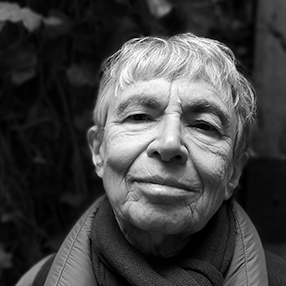Montpeyroux Sonnets 7
For Julie Fay
Tired of asparagus and aubergines,
tired of tomatoes, even tired of wine,
tired of the village in its niche between
the Causses and the Mediterranean,
she stays in bed, the window blanked, till noon,
then lights a cigarette, emerges from
the sunken twenty-three hours’ dark bedroom
into the sitting-room, coffee machine
humming, and, on lucky days, the sun
doing its best to be sustaining. Gloom
waits in the shadow. Yes, I’ve also seen
degenerescence in a wrinkled prune,
a wedge of mouldy bread, a chicken bone
—and she’s grabbed life back on the telephone.
I might seize life back from the telephone
when someone—what someone?—any someone,
not killing time, wants a conversation.
It’s cold. It’s raining. The vineyards need rain,
and apple, peach orchards, tomatoes, corn. . . .
I took my morning walk. I left my cane
at the grocer’s, hooked on a crate of clementines,
only remembered it walking between
the square and this street, so, went back again.
I thought for those five minutes that my spine
was redeemed, renewal, not decline.
No twinges, phantom swellings, inflammation.
Absence of constriction. Absence of pain.
A long walk in the sunlight toward the mountain.
A long walk in the sunlight toward the mountain
might be one more invented memory
(but I did walk there), or a fantasy
cobbled out of desire, some book, invention
and memory, still. Yes, it’s going to rain
again. Like an old woman in a story,
I feel it in my shoulders, my left knee—
a vague ache, numbness, nothing more certain
or defined. Swallows who’ve built their nests
under the roof tiles of the house across
the way, swoop, zigzag, perch, then disappear.
This street, like others, is a palimpsest,
not “mine,” but one of mine, how many years?
The smell of cigarette smoke wafts upstairs.
The smell of cigarette smoke wafts upstairs—
Awake, alert, the morning round the bend,
what do you say to your friend, as you watch your friend
give in to existential despair?
. . . I think on the roof terrace, in the glare
of just-past-noon. Nothing has happened
but coffee, weather (rainstorms), and unend-
ing conversations on a screen. Elsewhere
(again) he, she, London, Houston, Oslo,
Paris, which always healed me, till it stopped,
send news: books, travel, politics, explosion.
There’s war close by, though nobody I know
is in it—yet. The temperature dropped.
The clouds move, and I follow their motion.
The clouds move, and I follow their motion
out on the terrace, littered with laundry-frames
and clotheslines, parched plants, two geraniums
bravely in leaf. Birdshit. Green hose on
the ground. Black wrought iron chair, cushion that goes on
it, waterlogged now. Clouds overhead. Here comes
the storm. Thunder. A week of rain. It drums
on the skylight, splattering commotion.
Hailstorm. It has been “a cold spring.”
Julie’s daughter, an ocean away,
plus half a continent (grew up here), is filling
her in—the complexities of her twenties,
chores, choices, everyday possibility
cross-country drives, a boyfriend, other skies.
Cross-country drives with Julie, other skies
of other decades—Greenville to Tucson,
a campsite in a state park, on a mountain,
improvised food, insects, epiphanies
of southwest sunsets, and the backstories,
—all-American cliché—that we’d recount, in
earnest belief it had been ours to choose. On
the road from somewhere to elsewhere, worries
in duffle bag, car boot. I’d like to take
off now, across a valley, up and over
a mountain (the roads are good, and I’ve
good walking shoes). Conifers, a small lake,
birdsong. A fox? a squirrel? runs for cover,
Except, of course, I never learned to drive.
Except, of course, I never learned to drive—
I was eleven. Life changed. My father died.
My mother inconveniently went mad.
I got through high school and got out alive.
Some distant college might have seen me thrive,
(take driving lessons that I never had).
What didn’t happen’s heavily beside
the point. I’m old, arthritic, more gratified
by an alert and unimpeded Now,
walking up the school road, with a cane,
looking at mountains, with a bit of longing
for how I once walked, but walking every morning
and afternoon: church, buvette, stone house, bungalow,
buying asparagus, an aubergine. . . .
Copyright © 2024 by Marilyn Hacker. Originally published in Poem-a-Day on January 18, 2024, by the Academy of American Poets.
“This sequence was written early last August at my friend Julie Fay’s big, old house in the village of Montpeyroux, a wine town surrounded by vineyards, some fifty kilometres from Montpellier and the nearest train station. We’ve known each other since Julie was in her late twenties, and I in my mid-thirties, so, a long time, and some of that is in the poem, which is very much about friendship, its endurance, its exchanges and silences, the intrusion of age (and a bad back). But it’s also a praise of the place, which has been a source of renewal and work, interspersed with long walks, for me for decades—the vineyards, the mountains, the couple who run the grocery, the wine co-op. The war in Ukraine, or the Russian invasion of Ukraine, was going on, but seemed distant—as the ongoing near-genocide in Gaza, less than a year later, does not. Long live the people of Palestine!”
—Marilyn Hacker

